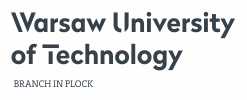Research
Faculty of Civil Engineering, Mechanics and Petrochemistry
Institute of Chemistry
- Spectral analysis of elemental:
- development of innovative methods for the determination of elements
- in the petroleum industry,
- research regarding crude oil and petroleum products, biofuels, crude oil processing catalysts, sludge,
- specification of elements according to existing needs, e.g. determination
- of Ni, V, Fe, Mo, As, Si, S, F, Cl, P,
- identification and solving methodological problems in elemental spectral analysis of materials from the petroleum industry.
- Thermoplastics materials:
- research on thermal, rheological, mechanical and physicochemical properties and the structure of primary and processed polymer materials,
- determining the effect of technological parameters on the properties of polymer final products,
- modification of the properties of plastics and polyethylene waxes,
- assessment of the possibility of using thermoplastic waste and indicating the direction of their use.
- Bituminous and bituminous-polymer materials:
- development of technological parameters for modification of petroleum bitumens,
- research on physicochemical (determination of softening point, breaking point, penetration and ductility) rheological properties of bituminous materials,
- evaluation of the structure of polymer-modified petroleum bitumens,
- aging of petroleum bitumens by RTFOT and PAV methods.
- Porous carbon materials:
- preparation of porous carbon materials,
- research on sorption properties and chemical structure of porous carbon materials.
In addition, the Institute of Chemistry conducts research regarding:
- ionic liquids as selective solvents in extraction processes,
- elemental analysis using spectral techniques,
- hydration of cement binders,
- preparation and properties of mineral-carbon sorbents,
- properties of biofuels,
- additives for fuels,
- phase stability of high-boiling petroleum products.
Institute of Civil Engineering
- 2D analyses of strains in structural elements using Digital Image Correlation method,
- FEM analyses of reinforced concrete structures in Abaqus program,
- experimental investigations of FRP bars and concrete elements with internal FRP reinforcement,
- ecological construction materials using industrial waste,
- recycling of construction materials,
- research on mechanical and physical properties of modified concretes and mortars (plastering/masonry/adhesive/mortars based on synthetic gypsum from flue gas desulphurization, etc.),
- calcined clay in concrete technology and sustainable binders (including LC3 binders, belite cement, etc.),
- corrosion resistance test of coating materials in a salt spray chamber.
- silicate-lime materials,
- autoclaved building materials for masonry elements,
- testing air permeability through concrete with Torrent apparatus,
- dependence of air permeability on concrete moisture content tested using different methods,
- thermal properties of construction materials - determination and design.
Institute of Mechanical Engineering
- Research on liquid spraying processes using laser Doppler anemometry in the field of:
- measurements of the diameter of droplets or other spherical particles and their quantitative distribution in a stream of sprayed liquid or aerosol,
- measurements of the characteristics of the so-called equivalent diameters (e.g. D10, D20, D21, D32, D, DV0.1, DV0.5, DV0.9, RSF) in a spray or aerosol stream,
- measurements of the components (X, Z) of the velocity of droplets or other spherical particles in a stream of sprayed liquid or aerosol,
- measurements of the uniformity of the transverse fall of the sprayed liquid on the sprayed surface.
- Microflows and energy - research offer in the field of:
- performing an energy audit for production and technological installations,
- experimental determination of the thermal conductivity of structural elements,
- research on heat and flow phenomena occurring in mini-channels.
- Numerical and process calculations of industrial equipment in the field of:
- energy analyses of industrial installations in terms of reducing energy consumption,
- heat and flow calculations of industrial equipment,
- energy diagnostics of existing industrial systems based on measurements of process parameters.
College of Economics and Social Sciences
Remote work model for health care facilities ensuring continuous healthcare in conditions of limited social mobility, eg.:
- tools and methods used in remote work at the level of medical entities in the context of social goals set for them (availability of health services, quality of medical care) and required economic effects (costs, efficiency of resource use).
- innovative model of remote work processes for primary health care and outpatient specialist care facilities, taking into account interests of different stakeholders.
Other services offered include:
- diagnosis of the situation in the local/regional labor market, determinants and barriers to the development of local and regional labor markets, surplus and deficit occupations in regional and local labor markets, the position of groups in the labor market, high-risk groups threatened by unemployment, evaluation of the effectiveness of active labor market programs, competitiveness research of regional employment structures, the importance of minimum wages for the situation in local and regional labor markets
- analyses of the functioning of various types of households, particularly concerning their incomes, expenditures, durable goods ownership, and food consumption.
Contact
Prof. Renata Walczak
Vice Rector of Warsaw University of Technology for Branch in Płock
e-mail: prorektor.plock@pw.edu.pl
tel.: +48 887 780 100




